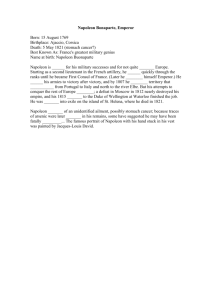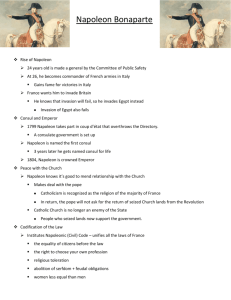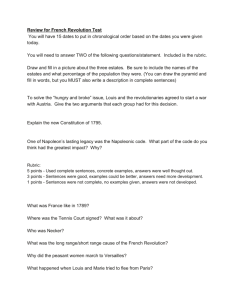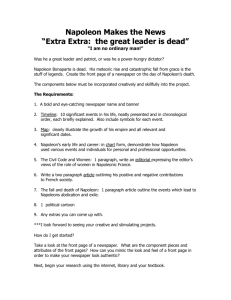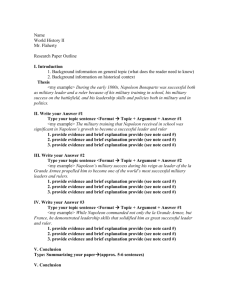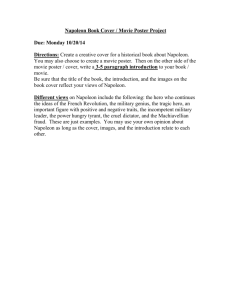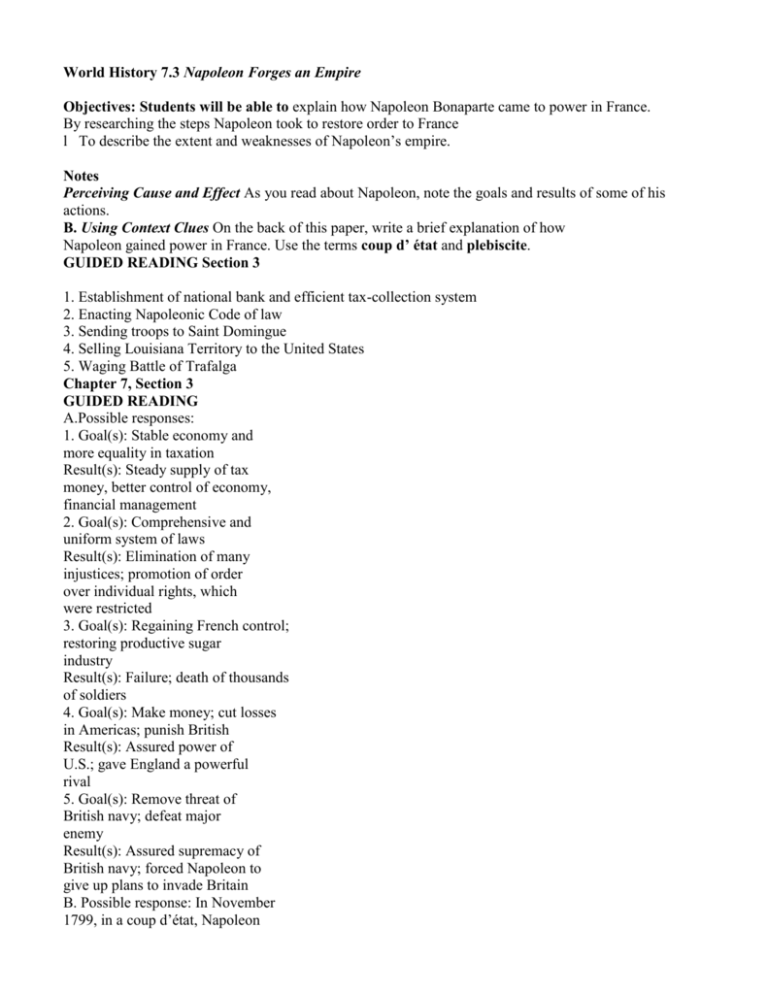
World History 7.3 Napoleon Forges an Empire
Objectives: Students will be able to explain how Napoleon Bonaparte came to power in France.
By researching the steps Napoleon took to restore order to France
l3 To describe the extent and weaknesses of Napoleon’s empire.
Notes
Perceiving Cause and Effect As you read about Napoleon, note the goals and results of some of his
actions.
B. Using Context Clues On the back of this paper, write a brief explanation of how
Napoleon gained power in France. Use the terms coup d’ état and plebiscite.
GUIDED READING Section 3
CHAPTER 7
1. Establishment of national bank and efficient tax-collection system
2. Enacting Napoleonic Code of law
3. Sending troops to Saint Domingue
4. Selling Louisiana Territory to the United States
5. Waging Battle of Trafalga
Chapter 7, Section 3
GUIDED READING
A.Possible responses:
1. Goal(s): Stable economy and
more equality in taxation
Result(s): Steady supply of tax
money, better control of economy,
financial management
2. Goal(s): Comprehensive and
uniform system of laws
Result(s): Elimination of many
injustices; promotion of order
over individual rights, which
were restricted
3. Goal(s): Regaining French control;
restoring productive sugar
industry
Result(s): Failure; death of thousands
of soldiers
4. Goal(s): Make money; cut losses
in Americas; punish British
Result(s): Assured power of
U.S.; gave England a powerful
rival
5. Goal(s): Remove threat of
British navy; defeat major
enemy
Result(s): Assured supremacy of
British navy; forced Napoleon to
give up plans to invade Britain
B. Possible response: In November
1799, in a coup d’état, Napoleon
overthrew the Directory and
assumed dictatorial powers as
the first consul of the French
republic. In 1800, a plebiscite
approved a new constitution that
gave all real power to Napoleon
as first consul.
© McDougal Littell Inc. All rights reserved.
90 Unit 2, Chapter 7
Name Date
SECTION QUIZ Napoleon Forges an Empire
Section 3
A. Terms and Names If the statement is true, write “true” on the line. If it is
false, change the underlined word or words to make it true.
Example: Napoleon became a hero of the French republic when he led troops against a group
of royalists. __________________________________________________________
Example: The term “the Second Coalition” refers to nations that supported France.
____________________________________________________________________
1. A coup d’état describes a sudden, forceful seizure of governmental control.
____________________________________________________________________________
2. At first, in an attempt to appear to be a constitutionally chosen leader, Napoleon held a vote of
the people or plebiscite. ________________________________________________________
3. As part of his reform program, Napoleon set up lycées, or national banks.
____________________________________________________________________________
4. In 1804, Napoleon Bonaparte, with the support of the French people, was made the president
of France. ____________________________________________________________________
5. To restore good relations with the Roman Catholic Church, Napoleon and the pope signed a
concordat, or agreement. ________________________________________________________
6. In Egypt and later in the Battle of Saint Domingue, Napoleon suffered rare military defeats at
the hands of the same man, British Admiral Horatio Nelson. __________________________
B. Critical Thinking Briefly answer the following question on the back of this paper.
Why do you think Napoleon became as popular as he did?
true
opposed
Answer Key
Chapter 7, Section 3
SECTION QUIZ
Napoleon Forges an Empire
A.1. true 2. true
3. public schools 4. emperor
5. true 6. Trafalgar
B. Answers will vary. Students
might make points similar to the
following:
a. He was seen as a savior of the
republic for his role in dispersing
a group of royalists.
b. He was a military genius who
savedFrance from the threat of
Austriantroops.
c. He was extremely well-liked by
the soldiers he led and inspired
patriotism and heroism.
d. France had suffered many years
of chaos, and he was the type of
leader who could restore order.
e. Many of his initial efforts as
emperor created needed
reforms that were appreciated
by the people.
© McDougal Littell Inc. All rights reserved.
48 Unit 2, Chapter 7
Name Date
PRIMARY SOURCE Napoleon’s Proclamation
at Austerlitz
Napoleon Bonaparte, emperor of France, conducted a brilliant military campaign
to expand the French empire. After French troops crushed a Third Coalition army
of Austrians and Russians in the Battle of Austerlitz, Napoleon issued this victory
proclamation on December 3, 1805. How do you think a French soldier might
have responded to this proclamation?
Section 3
Soldiers, I am satisfied with you. In the battle of
Austerlitz you have justified what I expected
from your intrepidity [unflinching courage]. You
have covered yourselves with eternal glory. An
army of one hundred thousand men which was
commanded by the emperors of Russia and Austria
has been in less than four hours either cut off or
dispersed. Those that escaped your swords have
thrown themselves into the lakes. Forty stands of
colors, the stands of the Russian imperial guard,
one hundred and twenty pieces of cannon, twenty
generals, and above thirty thousand prisoners are
the fruits of this ever-memorable battle. Their
infantry, so celebrated and so superior to you in
numbers, has proved unable to resist your charge,
and henceforth you have no rivals to fear.
Thus in less than two months the third coalition
is conquered and dissolved. Peace cannot be far
off; but, as I promised my people before crossing
the Rhine, I will conclude it only upon terms consistent
with my pledge, which shall secure not only
the indemnification [compensation for loss], but
the reward, of my allies.
Soldiers, when the French people placed the
imperial crown upon my head I trusted to you to
enable me to maintain it in that splendor of glory
which could alone give it value in my estimation.
But at that moment our enemies entertained the
design of tarnishing and degrading it; and the iron
crown, which was gained by the blood of so many
Frenchmen, they would have compelled me to
place on the head of my bitterest foe—an extravagant
and foolish proposal, which you have brought
to naught on the anniversary of your emperor’s
coronation. You have taught them that it is easier
for them to defy and to threaten than to subdue us.
Soldiers, when everything necessary to the
security, the happiness, and the prosperity of our
country has been achieved, I will return you my
thanks in France. Then will you be the objects of
my tenderest care. My people will receive you with
rapture and joy. To say to me, “I was in the battle
of Austerlitz,” will be enough to authorize the reply,
“That is a brave man.”
from Milton Viorst, The Great Documents of Western
Civilization (New York: Bantam, 1965), 201–202.
Discussion Questions
1. Recognizing Facts and Details According to
this proclamation, what happened to the Third
Coalition army in the Battle of Austerlitz?
2. Making Generalizations What did French
troops achieve as a result of this battle?
3. Making Inferences How would you characterize
Napoleon’s attitude toward the French soldiers?
CHAPTER 7
Answer Key
Chapter 7, Section 3
PRIMARY SOURCE
Napoleon’s Proclamation
at Austerlitz
Possible responses:
1. In less than 4 hours, an army of
100,000 Austrian and Russian
soldiers was defeated by French
troops. More than 30,000 soldiers
and 20 generals w e re taken
p r i s o n e r, and Third Coalition military
equipment was seized.
2. They won glory, proved their
superiority, demonstrated their
courage and loyalty, and helped
destroy the Third Coalition.
3. He was proud of their bravery
and grateful to them for vanquishing
the French Empire’s
foes. He also believed that their
victory upheld the honor of his
position as emperor.

